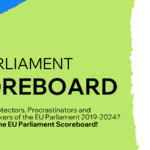The European grid operators ENTSO-E and ENTSOG have updated their scenarios for the Ten Year Network Development Plan 2020. CAN Europe welcomes that the grid operators improved transparency of their scenario building, however, while we are in a climate emergency and the European Commission plans to increase the EU climate targets, these scenarios are still trapped in an old energy world.
All scenarios still foresee high shares of fossil fuels during the coming decades and look at a modest uptake of renewables. This is in stark contrast with the need to reduce our emissions by at least 65% by 2030 and ensure 100% renewables by 2040.
“We hope that these assumptions will not become a self-fulfilling prophecy. Grid operators should rather prepare Europe’s energy infrastructure for a swift energy transition that brings about the necessary emission reductions by using proven solutions such as renewable energy installations and energy efficiency measures,” said the Director of Climate Action Network (CAN) Europe, Wendel Trio.
“The grid operators recognise in their scenario report that the parameters used might well need to be adjusted in view of evolving EU policies. It is high time to anticipate the infrastructure needs of a European energy system that is on track to the Paris Agreement. Instead of assessing how to accelerate the transition to clean energy, the scenarios assume fossil gas would still replace coal in electricity generation. Grid operators should plan now for immediate leapfrogging from coal to renewables,” he added.
CAN Europe has regularly provided input to ENTSO-E while they were building their scenarios during the last two years. This led to the introduction of a carbon budget to set a cap on the emissions of energy carriers chosen for the scenarios. CAN Europe welcomes this step towards an energy infrastructure planning that is compatible with the Paris Agreement. But all the grid operators’ scenarios allow for a high carbon budget. In addition, they largely bet on technologies such as carbon capture and storage. It is questionable whether these technologies will effectively cut down emissions to the level allowed under the cap of the carbon budget.
CAN Europe and the European Environmental Bureau launched a truly Paris Agreement compatible scenario. This civil society-led energy scenario for the EU shows a robust pathway to limit temperature rise to 1.5°C by achieving net-zero emissions by 2040 with a 100% renewable energy system. These elements should steer the way of infrastructure planning.
Background
The Ten Year Network Development Plan (TYNDP) is the biennial masterplan for European energy infrastructure. It defines investment needs and influences the allocation of public funds to projects such as cross-border gas pipelines and power lines. Hence, it supports the selection process of the Projects of Common Interest (PCI) by European Commission. The TYNDPs 2020 for gas and electricity infrastructure will enter into force by the beginning of 2021. Preparations for the following TYNDP 2022 start now in summer 2020 to be finalised by the end of 2022.
ENDS
Contact:
Cristina Dascalu, communications coordinator, cristina@caneurope.org
Climate Action Network (CAN) Europe is Europe’s leading NGO coalition fighting dangerous climate change. With over 170 member organisations active in 38 European countries, representing over 1.500 NGOs and more than 47million citizens, CAN Europe promotes sustainable climate, energy and development policies throughout Europe.

